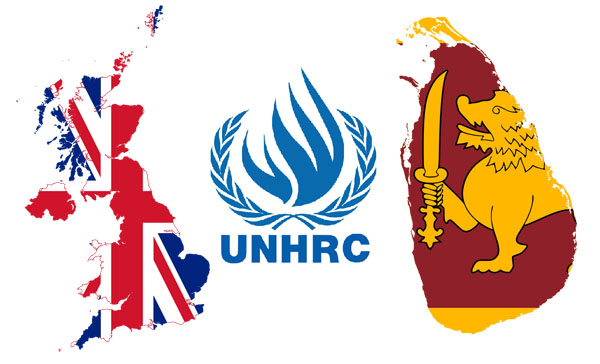The Core Group on Sri Lanka at the UN Human Rights Council have expressed concern over the recent legislative developments regarding human rights in the country.
UK’s Deputy Permanent Representative to the United Nations Rita French delivering a statement on behalf of the Sri Lanka Core Group comprising Canada, Malawi, Montenegro, North Macedonia, the United Kingdom and the United States stressed that the Online Safety Act has the potential to severely restrict online communication and could potentially criminalise nearly all forms of expression, creating an environment that has a chilling effect on freedom of expression.
They urge the government to enact amendments to align the Act with Sri Lanka’s human rights obligations and commitments.
Further more, the Core Group called for the Prevention of Terrorism Act (PTA) to be replaced with legislation that is consistent with Sri Lanka’s international obligations, and encourage the release of unjustly held long-term PTA detainees and for Sri Lanka to maintain a moratorium on its use.
“As the government brings forward other legislation with potentially serious implications for fundamental freedoms and civic space, we encourage comprehensive consultations with stakeholders, including civil society, and due legislative process,” she noted.
FULL STATEMENT: This statement is on behalf of the Sri Lanka Core Group comprising Canada, Malawi, Montenegro, North Macedonia, the United Kingdom and the United States.
High Commissioner,
There have been several important legislative developments regarding human rights, reconciliation and civic space. Unfortunately, some of these developments give cause for concern.
The Online Safety Act has the potential to severely restrict online communication and could potentially criminalise nearly all forms of expression, creating an environment that has a chilling effect on freedom of expression. We urge the government to enact amendments to align the Act with Sri Lanka’s human rights obligations and commitments.
We continue to call for the Prevention of Terrorism Act (PTA) to be replaced with legislation that is consistent with Sri Lanka’s international obligations. We acknowledge the recent release of nine Tamil leaders detained last November. We encourage the release of unjustly held long-term PTA detainees and for Sri Lanka to maintain a moratorium on its use.
While we note the government’s efforts to establish a Commission on Truth, Unity and Reconciliation, we stress the importance of an inclusive participatory process to build trust in advance of any legislation. Any future commission must be independent, inclusive, meaningful, and transparent, meet the expectations of affected communities, build upon previous transitional justice processes, and provide pathways for accountability.
As the government brings forward other legislation with potentially serious implications for fundamental freedoms and civic space, we encourage comprehensive consultations with stakeholders, including civil society, and due legislative process.
We welcome the government’s stated commitments on land releases but note with concern reports of increased tensions around land seizures in the north and, particularly, the east of the country.
High Commissioner,
We urge the government to engage with you and your office to address these and other challenges, and we remain ready to support Sri Lanka in addressing HRC resolution 51/1.


